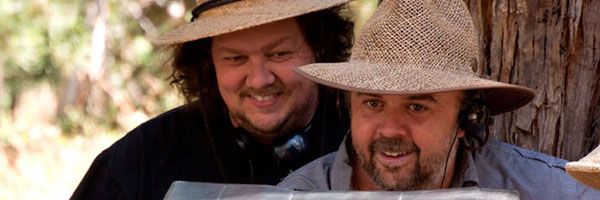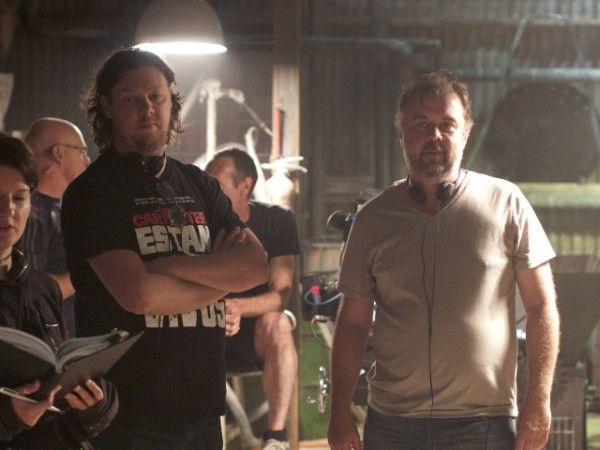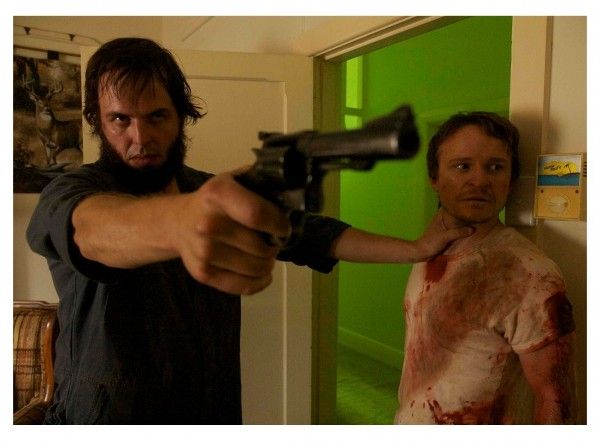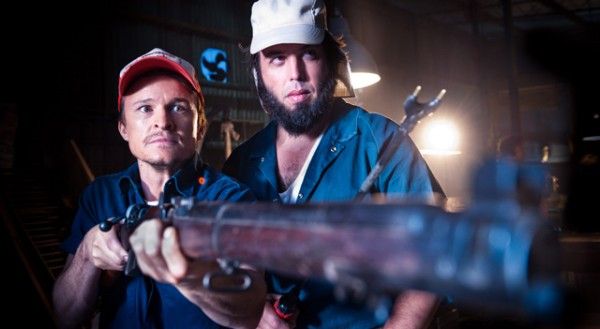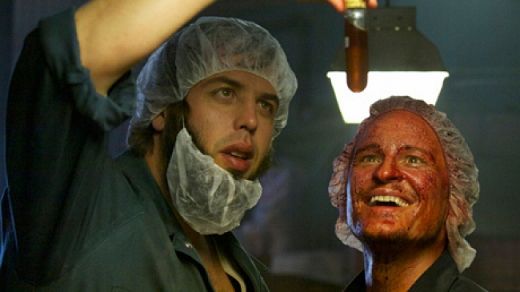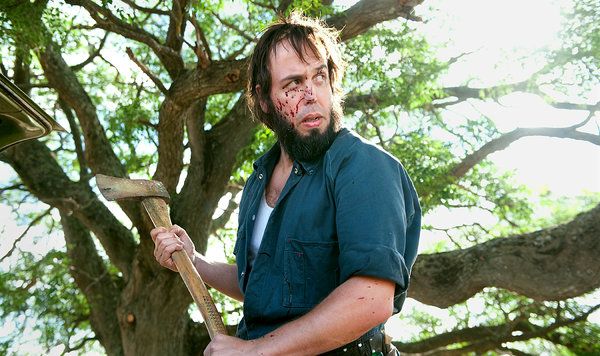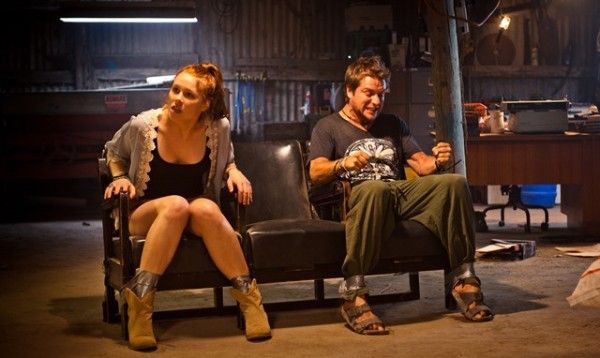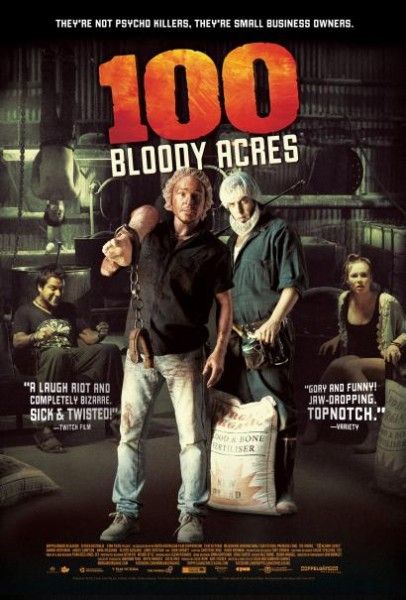You don’t often get to call a horror film delightful, but 100 Bloody Acres is a one-of-a-kind movie that definitely fits the descriptor. The Morgan Brothers have just discovered the missing ingredient to the perfect bone and blood fertilizer blend – people parts. When the hapless Reg (Damon Herriman) finds a car crash victim on the side of the road he sees an opportunity to fill an important order and impress his domineering older brother Lindsay (Angus Sampson), but on his way home Reg finds a trio of broken down travelers, and smitten with the beautiful Sophie (Anna McGahan) he foolishly offers them a ride. Of course everything goes to hell when they find the body in the back of the truck, and what follows is an absolutely charming mess of blood and body parts with a surprisingly warm-hearted story about finding out who you really are.
Earlier this week I participated in a group interview with writer/directors Colin and Cameron Cairnes at the film’s L.A. press day. They talked about shooting the film in Adelaide, the years they spent working on the script, making a film in the vein of 70’s horror, and the state of Australian cinema. They also talked about blurring the lines between protagonist and antagonist, the films unique structure, viewing the film with an audience, and a lot more. Hit the jump to see what they had to say.
Collider: I want to know what they needed from the human bodies to make this fertilizer. Were they taking the blood?
CAMERON CAIRNES: Potassium, nitrate, calcium – the essential ingredients to their organic fertilizer. Look, we may have taken a few liberties with what’s actually required of a fertilizer blend, but I guess the joke was that it was the potassium levels that were so special. We took a little bit of license.
COLIN CAIRNES: It’s a bit of a leap of faith.
CAMERON CAIRNES: Yeah, but hopefully everyone does it with so much conviction that we get away with it.
My first thought was wouldn’t it be against the law to go around picking up human road kill?
CAMERON CAIRNES: In most countries, Australia’s always been a little bit different in that respect [laughs].
COLIN CAIRNES: Whatever it takes to get ahead in business.
CAMERON CAIRNES: That’s a good tagline. We should have gone with that. Yeah absolutely, I guess that’s why the brothers have been at pains to try and keep that a secret from the authorities. Yeah, they’ve been getting away with it, but obviously the film is really about them not getting away with it and realizing that their time’s up.
We just talked to the cast and seeing them together it’s so easy to see why you cast them all.
COLIN CAIRNES: Yeah, and there was a great chemistry between those guys, I just know they all had a ball. We were shooting just outside the city of Adelaide in the hills and everyone sort of came over to stay, we all live on the other side of Australia so everyone got to have a little holiday in Adelaide and I know those guys got on great. They never invited us. [Laughs] We know they just had a great time and I think that fed into their performances and that chemistry on screen. Even though they’re all supposed to argue with each other and seemingly hate each other I think having that camaraderie just helped in developing their dynamic.
CAMERON CAIRNES: Yeah.
Where did this story come from? You’ve got multi-layered characters, they’re not the typical one-note types that you find in a parody or comedy like this and the story as a whole is just so creative and fun.
COLIN CAIRNES: Oh, thanks. It’s a good question and it’s a hard one to answer. I’m not trying to be funny, but the thing just grew very organically. It really did. We just wanted to make a really kickass horror film to start with. We love all that 70’s – Texas Chainsaw Massacre, Hills Have Eyes, all of that American indie horror from the 70’s. So that was kind of the inspiration, we wanted to do something like that. So it was always going to be the young adults in peril out in the outback, but we just kept writing and writing. And because we weren’t writing for anybody but ourselves we just took our time with it, and bit by bit these characters evolved and we started to fall in love with all of them, even the baddies. And plotting, it wasn’t like we had a- well we write differently now, but back then we didn’t really have an end goal in sight, we didn’t really know where things were going and I think that’s why you do get a lot of these interesting twists and turns.
CAMERON CAIRNES: Yeah, we would just write ourselves into a corner and try to come up with a solution. Often it was the most ridiculous solution, but we would go with it and see where that took us.
COLIN CAIRNES: Ridiculous but kind of logical as well.
The visual palate is stunning, you’ve got some saturation, you’ve got great color and I know you used the Alexa.
CAMERON CAIRNES: Correct, beautiful.
For some of the scenes you’ve got, in the trunk and the barn, I can’t see you using film, so how did you go about developing and working with your DP for the visual tone that you have?
COLIN CAIRNES: I think we always wanted it to look classically composed. You tend to see a lot of horror films these days very handheld and dimly lit. I think it was just maybe a conscious decision to buck that trend, and also to take it back to a more classical period horror where things were maybe a little bit more colorful and richer.
CAMERON CAIRNES: And the cutting isn’t as frenetic. You let the performances kind of play out and enjoy the mise en scene. For a low budget film I think the production design and all that is stuff is pretty- we were just lucky to get those locations, filming in the Adelaide hills. We found this amazing location, we approached the people and they said yes, and it was like, “thank god,” because all the other places we had seen weren’t so great. So we were very fortunate in that. And it was the time of year that we shot, it was the middle of summer and we got those dry, straw colored hill and all of that. So we just embraced that. When you’re on a low budget you can’t fight what you’re given, you know what I mean? You’ve just got to embrace it and make the most of it.
COLIN CAIRNES: John Brawley, our DP, is just a very resourceful and talented guy, and largely works in TV because there’s not a hell of a lot of features being made in Australia. So he works very quickly and his department responds to him. He’s just a really lovely guy and gets the best out of everyone.
Is the Australian film fund still around?
COLIN CAIRNES: Yeah.
Are they making less now, just like here we are making less? Because you guys had some great movies coming out of there in the late 90’s.
COLIN CAIRNES: Yeah, the 90’s were a good period. I think there’s just less money around. The economy in Australia hasn’t been doing too badly, but I think every year the budgets are a little bit less. So yeah it’s very hard to get a film up.
That’s terrible because you guys had great stuff coming out.
CAMERON CAIRNES: It’s just not seen as backable at the moment, because we have had quite a few flops as well, truth be known. Last year there was this big hit called The Saphires I think it might have played here, but since then we haven’t had anything that’s done terribly well, which makes it harder to get different unconventional project up as well.
Do you use kickstarter as we do here?
COLIN CAIRNES: We do, lots of directors are using it. I don’t know that were having that much success. I think the money is generally being used for short films and pitch or sizzle material as a way of getting to the next step. We tried it for one project.
CAMERON CAIRNES: When it started out, I think it had started to take off here, but no one in Australia knew about it. It was Indiegogo that we used to try to get some development funds for another project, in fact the script we’re working on now. We just wanted to workshop it with actors; get them in a room, all that kind of stuff. I think we were asking for $1500, and I think we got close to it and did what we said we’d do, but yeah it seems a lot of work. All that stuff requires so much time and management. It’s like with the social media as well, again when you’re on a low budget film that work falls on your shoulders.
How was the return on this in Australia? How did it do?
COLIN CAIRNES: It hasn’t even been released.
CAMERON CAIRNES: You guys are getting it first.
Is that weird for you?
COLIN CAIRNES: It’s pretty weird, yeah. We’re quite chuffed in a way, but it’s great because if – and look, the response here has been terrific and it’s almost like Australians need that validation from you guys to make us feel good about ourselves.
CAMERON CAIRNES: Yeah.
COLIN CAIRNES: And then for everyone else to realize that we’ve got a decent product.
CAMERON CAIRNES: Yeah. There’s a bit of a cultural cringe thing that happens in Australia, and it’s maybe not as bad as it used to be, but the old joke was as soon as an American celebrity got off the plane, as soon as they hit the tarmac the journos would be asking, “So, what do you think of Australia? Do you love us? What do you think?”
COLIN CAIRNES: We’re very insecure.
CAMERON CAIRNES: Insecure people, yeah. No need to be, I mean there’s lots of talent and skill. Hopefully the word of mouth here is great and that will through whatever channels get across to Australia. It opens the first of August [in Australia].
I took this as more of a crime film than horror. It took on a difference of significance, for me, with Sophie and she becomes the hero in the end. So how did that happen? Because you start choosing sides after a while.
COLIN CAIRNES: Yeah, absolutely, which is kind of what we wanted. We always said it would be a choose-your-own-hero adventure. Okay we’re calling it comedy horror, but it’s a bit of a romp or it’s a ride that was the intention to entertain however the hell we could. Who knows, we might not get to make another movie so let’s just throw everything at it and see what happens. Originally we were going to do this real time thing where you follow – you know Slacker, the Richard Linklater film, we were going to do a horror version of that. Where you follow one character for 15 minutes and then something happens and your follow someone else. And I think it’s still got a bit of that flavor, your allegiances sort of flip and flop a little bit.
I think the biggest achievement of this film was the fact that you played with the dynamic of protagonist and antagonist with the brothers.
CAMERON CAIRNES: Yeah we love all those character, but that moment, that big Grand Guignol transformative moment for both characters they realize okay this is serious now. Lindsay goes one way and Reg goes the other.
One of the big gags in the movie is the relationship between Sophie and --- and his reaction to her infidelity.
COLIN CAIRNES: I think that was always the intention from the start to have this relationship drama playing out in the middle of this horror and that being almost more horrific than the horror, well for that character anyway.
CAMERON CAIRNES: What’s more horrific, being minced alive or finding out that your woman is sleeping around?
I want to ask about the ring, because he gives her the ring at the end and for me I was like, “this guy can’t be proposing.”
COLIN CAIRNES: [laughs] That’s kind of left to your own interpretation. We like to think that he is proposing in a way, or that there’s potential.
CAMERON CAIRNES: It’s symbolic of there being a connection at least. We’ve had other people suggest that when the credits roll she would push the button and send him through the grinder. Some people read it like that, which is interesting.
COLIN CAIRNES: You’ve met Anna McGahan, how could she be playing anything but the sweetest character. She does what she does to survive, but she’s got compassion.
Being that this is your feature film debut, what did you find to be the most challenging aspect of the process?
COLIN CAIRNES: Its time, it’s the time thing. Five weeks is pretty tight I think. I don’t know what the average is here, but five to six weeks is about the average for a lowish budget in Australia, but when we’re being quite ambitious with the prosthetic stuff and also the performance, trying to make these well rounded characters, three dimensional characters. So not having time to rehearse and do that extra take, that’s the thing. But we were just fortunate to have those actors who all understood their characters and had a great sense of humor and just got where we were coming from. We were very fortunate in all sorts of ways. But yeah, there’s little compromises when you just want another couple of takes, another couple of angles.
CAMERON CAIRNES: Yeah.
COLIN CAIRNES: There are some scenes that we when watch the film we go, “It was so rushed. We had a half an hour on Wednesday and then fifteen minutes on Friday to finish that scene.” But look, it all came together and we fortunately edited the film so we knew exactly what-
CAMERON CAIRNES: That was another challenge in itself because we had a very tight deadline. We finished shooting it late February and then had it delivered mixed and graded, everything, by early June.
COLIN CAIRNES: Yeah, we had about two months to edit.
How did you guys divide up the responsibilities? Did one of you deal more with the actors, one more with the technical aspects? Or was it kind of an ebb and flow?
CAMERON CAIRNES: It was probably more of an ebb and flow, but again it’s that time thing because time was tight. Having the two of us we could deal with anything that came up at any given time. And it’s not like we would have a differing opinion on anything. We were practically on the same page with every detail, so people got used to that idea they knew that they didn’t have to come to both of us to get the same response.
COLIN CAIRNES: There was this period going on where they would go an talk to Cam about something and then sometimes come and double check with me and vice versa. They realized that it didn’t have to work that way because we were so well prepared with the storyboard. I mean we’d been working on the script for five or six years. And when there were differences of opinion it was funny to see what would happen. Something would come up, “Oh what happened there? That works. Great, we’ll leave it.”
What was your reaction the first time you saw it with an audience? What did you feel?
COLIN CAIRNES: Sheer Terror [laughs] No, it was great because it played in our hometown of Melbourne so maybe we had a slightly sympathetic audience. But all those beats they seemed to get, all those jokes that had been planned years in advance so seeing it pay off was a real thrill.
CAMERON CAIRNES: Yeah, but last night we had a little screening at the silent theater and that was as good, it was a much smaller crowd, but outside the world premiere at the Melbourne Film Festival that was the best experience I’ve had seeing the film with a crowd. Even the references that were very local, very Australian, I think people understood them even if they didn’t get a specific reference they knew the context and it worked.

